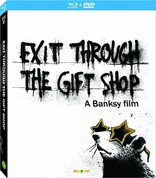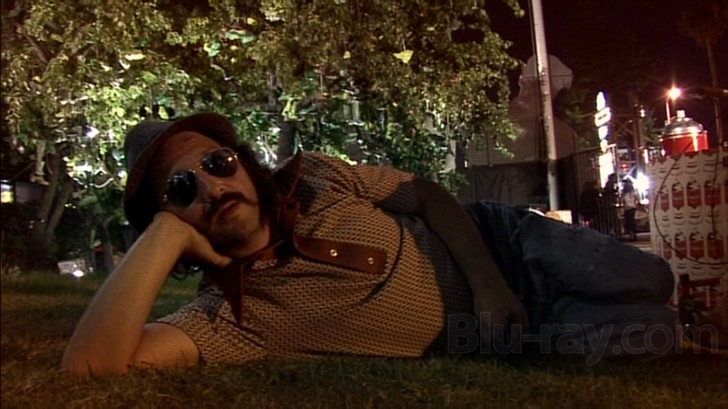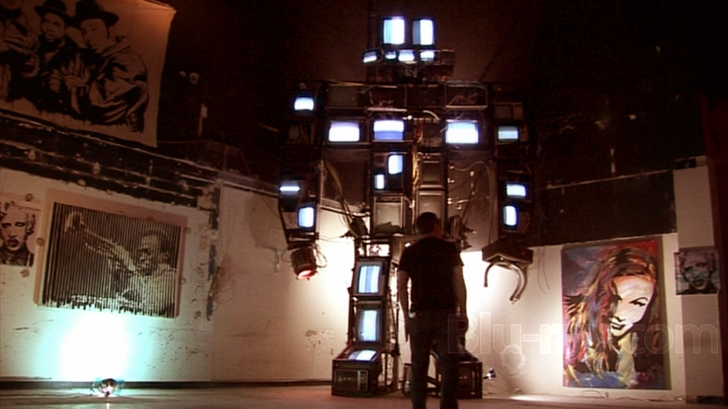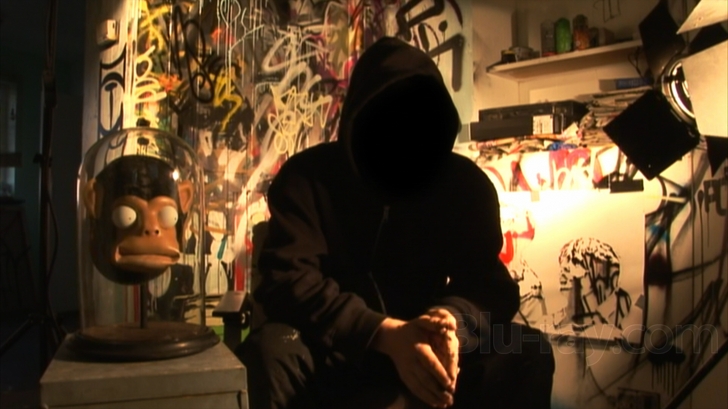Exit Through the Gift Shop Blu-ray Movie
HomeExit Through the Gift Shop Blu-ray Movie 
Blu-ray + DVDOscilloscope Pictures | 2010 | 87 min | Rated R | Mar 08, 2011

Movie rating
7.8 | / 10 |
Blu-ray rating
| Users | 0.0 | |
| Reviewer | 4.0 | |
| Overall | 4.0 |
Overview
Exit Through the Gift Shop (2010)
The story of how an eccentric French shop keeper and amateur film maker attempted to locate and befriend Banksy, only to have the artist turn the camera back on its owner with spectacular results. Billed as "the world's first street art disaster movie" the film contains exclusive footage of Banksy, Shephard Fairey, Invader and many of the world's most infamous graffiti artists at work.
Narrator: Rhys IfansDirector: Banksy
| Documentary | 100% |
Specifications
Video
Video codec: MPEG-4 AVC
Video resolution: 1080p
Aspect ratio: 1.78:1
Original aspect ratio: 1.78:1
Audio
English: DTS-HD Master Audio 5.1
English: DTS-HD Master Audio 2.0
Subtitles
English, English SDH
Discs
25GB Blu-ray Disc
Two-disc set (1 BD, 1 DVD)
DVD copy
Playback
Region free
Review
Rating summary
| Movie | 4.5 | |
| Video | 4.0 | |
| Audio | 4.0 | |
| Extras | 2.5 | |
| Overall | 4.0 |
Exit Through the Gift Shop Blu-ray Movie Review
Banksy pokes the eye of the beholder.
Reviewed by Casey Broadwater March 7, 2011As its clever title implies, Exit Through the Gift Shop hangs around at the intersection between art and commerce. In a single longwinded sentence, it’s about Thierry Guetta, a talent-less Frenchman who set out to make a documentary about street art only to become the subject of this documentary as he emerged as an “artist” himself, churning out derivative works that—because of a carefully calibrated hype machine— instantly attracted the money and attention of dealers and critics. Almost overnight, Thierry went from being a nobody with a video camera to an up- and-coming celebrity in the international art scene, referring to himself by the pseudonym “Mr. Brainwash.” And yet, there’s some speculation that Guetta and his artistic alter-ego may, in fact, be an elaborate hoax on the part of Exit Through the Gift Shop's creator, Banksy, the elusive and anonymous star of the street art movement, whose own stencil-and-spray paint works have fetched hundreds of thousands of dollars at auctions. Is Mr. Brainwash the real deal—a hack who lucked his way into being a millionaire—or is he really just Banksy’s latest work of subversion, illustrating a contempt for the capitalist and commoditized art industry? The world may never know.

Mr. Brainwash
Squat and hirsute, with muttonchop sideburns that rise into a connected moustache, Thierry Guetta looks like a cross between Super Mario and some nameless, hapless thug Bill the Butcher might’ve killed in Gangs of New York. A Gallic émigré residing in Los Angeles since the early 1980s, he made a decent living as the owner of a fashion boutique, passing off cheap clothes from France as designer vintage duds. (Already he’s trading in knock-offs.) Guetta was also obsessed with recording every aspect of his life, to the extent of carrying a video camera around with him at all times. In 1999, during a vacation to Paris, he discovered that his cousin was actually “Space Invader,” an artist known for his pixilated bathroom tile recreations of the eponymous videogame villains. Suddenly, Guetta had a calling—to compulsively document the nascent street art scene.
Soon, with his camera in tow, he was trailing graffiti artists with oddball aliases like Swoon, Borf, and Buffmonster as they scuttled rat-like through the night, defacing walls with their illegal, ironic, often anti-materialist propaganda pieces. Back in L.A., Guetta even shadowed and befriended Shepard Fairey, whose OBEY images—featuring a stylized Andre the Giant—were already ubiquitous in major cities throughout the world. (Fairey would later become known as the creator of Barack Obama’s iconic 2008 campaign poster.) There was only one major player missing from Guetta’s supposed documentary: Banksy, the notoriously secretive British artist whose bleakly comic spray paint satires and street-side installations were just beginning to draw major attention to what had been an exclusively underground movement.
Since the lines between reality and possible fiction are starting to blur, it makes sense to switch here to present tense. Of course, Banksy and Guetta eventually meet, and since Banksy recognizes that his art form is inherently ephemeral—graffiti, even big name graffiti, often gets whitewashed over within a day or two—he agrees to let Guetta tag along and record his covert exploits, including a stunt at Disneyland that involves tying an inflatable Guantanamo detainee to a fence next to the Big Thunder Mountain Railroad. What Guetta doesn’t tell Banksy—or Fairey, or Space Invader, or any of the others—is that he has no plans to actually craft a documentary out of any of this footage. The whole ruse has basically been Guetta’s excuse to hang out with the artists he idolizes. He’s amassed thousands of tapes, but he’s never once looked at them. At Banksy’s urging, Guetta does finally edit the near-endless material into a 90-minute film called Life Remote Control, but instead of a chronicle of the rise of street art, it’s an amateurish, incoherent jumble of quick-cut editing. “It was at that point,” Banksy says, his voice digitally modulated and his face obscured, “that I realized that maybe Thierry wasn’t actually a filmmaker, and he was maybe just someone with mental problems who happened to have a camera.”
And here’s where things get really interesting: the documenter becomes the documented. Banksy takes all of Guetta’s footage, with plans to craft his own film out of it, and sends Thierry off with a direct order—to put down the camera and become a street artist himself. He does this primarily to get Guetta out of his hair, and he doesn’t anticipate what Thierry will do next. (Or does he?) After remortgaging his business, Guetta rents a studio, hires a team of graphic designers and artists to help him churn out screenprinted artworks factory-style, and rebrands himself as Mr. Brainwash. Then, he sets up an enormous debutante show in an abandoned CBS building, and with a barrage of advertising—including a strategically used blurb from Banksy—he builds up the hype to ridiculous levels. Some four thousand art-hungry Los Angelites show up on the first night, and by the end of the week Mr. Brainwash has raked in nearly a million dollars in sales, even though the pieces are all blatant rip-offs of other artists. Banksy puts it best: “He's kind of the rightful heir to Andy Warhol in a way. Andy Warhol made a statement by repeating famous icons until they became meaningless, but he was extremely ironic in the way that he did it. But then Thierry really made them meaningless.”
The obvious commentary here is on how art consumers—the public, curators, dealers, auctioneers and all—are susceptible to fads, hype, and gullibility. (“Maybe it means art is a bit of a joke,” Banksy suggests, with the implication that the joke is on, well, everyone.) Whether Mr. Brainwash is a Banksy-assisted sham or an inexplicably self-made man, the reality of his sudden success says a lot about the state of modern art. If the film is a hoax, it’s a far better one than Casey Affleck and Joaquin Phoenix’s I’m Still Here, which explores similar themes of celebrity, media, and self-promotion. In the end, though, it doesn’t matter. By hook or by crook, “Mr. Brainwash” is now an actual “artist,”—whatever that means—and Exit Through the Gift Shop stands as a fascinating glimpse into the street art sub-culture, from the thrill of illegal vandalism to the big bucks that spray-can masterpieces now command. And real or not, it’s a terrific comedy, with Guetta as a hapless buffoon who unwittingly cons his way into stardom. “I used to encourage everyone I met to make art. I used to think everyone should do it,” Banksy says. He pauses with perfect comedic timing before adding, “I don’t really do that anymore.” If we could peer though the impenetrable darkness inside his hoodie, I’m pretty sure we’d see a wink and a wry smile.
Exit Through the Gift Shop Blu-ray Movie, Video Quality 

Although Exit Through the Gift Shop is presented with a 1080p/AVC encode, it's important to note that the film has been put together from endless hours of Thierry's standard definition footage—footage that's often shaky, blurry, and poorly lit. Artifacts run rampant, aliasing shimmers across what should be straight lines, and chroma noise is in abundance. Color is weak and fine detail is entirely absent. Yet, it is what it is. The film isn't supposed to look "good," and there's no use trying to judge the picture quality against any objective scale. Oscilloscope Pictures has presented the film as is, and I'm giving it high marks for being true to its less-than-stellar source.
Exit Through the Gift Shop Blu-ray Movie, Audio Quality 

The film's DTS-HD Master Audio 5.1 surround track has some of the same kinds of limitations when it comes to Thierry's footage—slightly muffled voices,
most notably—but once again, it is what it is, and there's very little Oscilloscope could've done about it. That said, Rhys Ifans' tongue-in-cheek narration
sounds wonderful—clear and balanced in the mix—and all of the music used throughout the film has real presence, especially the synth-heavy numbers.
The rear channels are used almost exclusively for the soundtrack, but the added envelopment is appreciated. Where Oscilloscope's version trumps the
film's U.K. release is the inclusion of English* and English SDH subtitles, making Banksy's modulated voice a bit easier to understand.
*For whatever reason, I couldn't get the English subtitles to work on my firmware-updated PS3. The English SDH subs, however, worked just fine.
Exit Through the Gift Shop Blu-ray Movie, Special Features and Extras 

- A Star is Born (SD, 7:09): In 2008, Banksy invited 40 street artists from around the world, along with Mr. Brainwash, to participate in the Cans Festival, a street art show staged in a disused tunnel. Along with the first public showing of one of his works, Thierry was on hand to film the event.
- More Brainwashing (SD, 5:16): A few short deleted scenes, including one where Thierry cleverly uses Craigslist to prepare the CBS building for his art show.
- Life Remote Control (SD, 15:03): Thierry's nigh-unwatchable hour and a half "documentary" about street art has been truncated to fifteen minutes here at the recommendation of the artist's lawyers. It begs the question: Was there ever really 90-minutes of material to begin with?
- B Movie (SD, 13:36): A short but informative overview of Banksy's career, featuring interviews with—among others—Dennis Hopper, Damien Hirst, 3D of Massive Attack, a number of art critics/dealers, and Banksy himself.
- Packaging: Inside Oscillosope's usual fold-out packaging—nestled tightly in a cardboard slipcase—you'll find a pair of holographic glasses, two postcards, and some stickers. Nice!
Exit Through the Gift Shop Blu-ray Movie, Overall Score and Recommendation 

Although Exit Through the Gift Shop didn't win Best Documentary Feature at the 83rd Academy Awards, it gets my vote for being clever, funny, and scathing. Is it a hoax? Who knows and who cares? The speculation only adds to the film's mystique. This is easily the best documentary I've seen so far this year. Highly recommended!
Similar titles
Similar titles you might also like

A Beautiful Planet 4K
IMAX Enhanced
2016

Hitchcock/Truffaut
2015

Jodorowsky's Dune
2013

Elstree 1976
2015

Amazing Grace
Aretha Franklin
2018

Armstrong
2019

NOVA: The Planets
2019

Filmworker
2018

King Cohen: The Wild World of Filmmaker Larry Cohen
2017

The Last Man on the Moon
2014

Where to Invade Next
2015

Drunk Stoned Brilliant Dead: The Story of the National Lampoon
2015

Cosmos: A Spacetime Odyssey
2014

Space Junk 3D
IMAX
2013

Sicko
2007

How the Universe Works
2010

3-D Rarities
1922-1962

IMAX: Dream Big: Engineering Our World 4K + 3D
2017

Voyage of Time
2016

Mankind: The Story of All of Us
2012